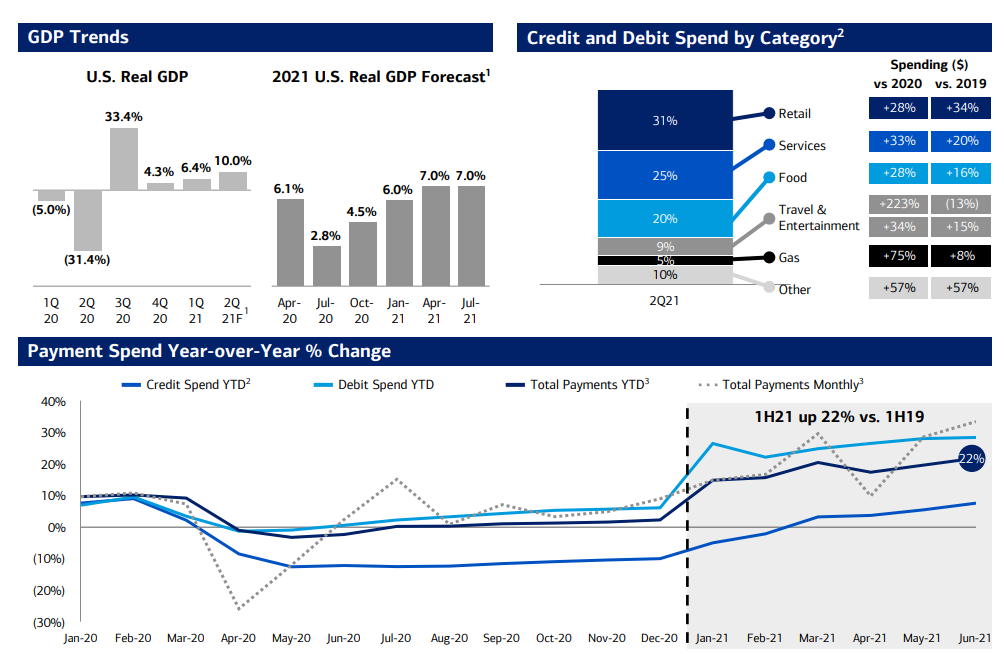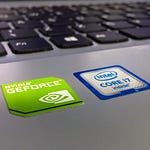Welcome to Episode 25 of The Transcript Podcast. The podcast and the transcript will be sent out to all subscribers this week.
Episode Summary:
In this episode, we discuss we discuss how the largest US banks are doing, continued discussions around inflation, and the Delta variant that is beginning to get the attention of the C-suite.
The episode is based on yesterdays’ newsletter which is available on Substack.
Show Notes:
00:00:00 Introduction
00:00:40 Strong economy but supply chain bottlenecks persist
00:01:21 The Fed and Treasury insist the inflation is transitory
00:03:22 Delta variant might slow down the party
00:05:17 Banks are doing very well
00:06:33 Bank CEOs really want people back in the office
Episode Transcript:
Introduction
Scott: [00:00:00] Welcome to a new episode of The Transcript podcast. You've got me Scott Krisiloff, I'm the editor of The Transcript, along with Erick Mokaya who's our lead author. We sent out a new issue of The Transcript yesterday and it was the first week of earning season so a lot of good stuff in there. This week's issue, I should mention, is for paying subscribers only since it is the beginning of earnings season when a lot of new stuff comes across, we wanted to reward our paying subscribers by giving them a chance to have a first look at all of this stuff that we got this week. So there was a lot of good stuff, but we wanted to make sure that the podcast was still open to all of our subscribers. So welcome to everyone, both paid and free today.
Strong economy but supply chain bottlenecks persist
Anyways, what we saw in the earnings call is were a continuation of the themes that we've been seeing for the last several weeks and months. The economy is still doing really, really well, very strong, high demand. One of the things that we picked up was just confirmation from some of the industrial companies that supply chain bottlenecks are likely to persist through this year, into next year. Taiwan Semiconductor said into 2022 that there'll be semiconductor shortages.
Source: Bank of America
And so that being one of the major drivers of the inflation that we're seeing, I don't know what the definition of transitory is, but it's looking like this may be with us for a little bit longer than people are expecting. Any comment, Erick?
The Fed and Treasury insist the inflation is transitory
Mokaya: [00:01:21] I agree. I think what you see is a little bit of a discrepancy between what the regulators see and what the companies are seeing. So I think JP Morgan and Fastenal were quick to point out that they think it's not that transitory. But I guess by transitory, they mean a short while, which would mean less than a year or so. But I think the Federal Reserve Chair and the US Treasury Secretary disagree in saying that this is just medium-term and then needs to be back to normal levels. I would tend at this point, I may be a little bit biased, but having read a lot of the earnings calls that we've read so far, I tend to see a lot of the CEOs are actually seeing that a lot of inflation as you say, like supply chain bottlenecks causing them to rethink prices across products. So I mean, I would tend to agree more with the CEOs than the Federal Reserve at this point in time. What do you think yourself?
"Inflation has increased notably and will likely remain elevated in coming months before moderating" - US Federal Reserve Chair Jerome Powell"...over the medium term, we’ll see inflation decline back toward normal levels." - US Treasury Secretary Janet Yellen
Scott: [00:02:11] Yeah, I mean, we've talked about this a lot of times. Inflationary periods tend to be transitory. I think monetary policy has historically and probably right now a major driver of inflation. So when you have QE going on and printing huge amounts of money and injecting it into the economy, price levels are going to go up. As long as the QE policies persist, I think we're going to have above-trend inflation.
There's an anecdote that's really just blown my mind this week that I noticed in Los Angeles on Redfin. There was a house that last year sold. It was a total tear down at the time, but the lot was sold for $3.5 million. The person who bought it, just tore the house down, leveled the lot, put nothing else up and reenlisted the house for four and a half million dollars. And then I noticed it sold for $4.9 million. So over the course of a year, somebody bought a piece of property in LA, just tore down the house, took value away from the property and then sold it at a one and a half million dollar gain. That's the type of stuff that's going on in housing markets around the US.
Mokaya: [00:03:20] That's really insane.
Delta variant might slow down the party
Scott: [00:03:22] The other thing in the macro section that we picked up that we should probably talk about is the Delta variant. In LA, especially right now, there's been a pickup in infections and that could have an impact on how freely people are going to restaurants and traveling and gathering in groups. At least for some period of time.
"The Delta variant, should it spread further, could spear policy actions at slow economic growth. We are already seeing this play out in places like Hong Kong and Australia and potentially in parts of Europe." - Goldman Sachs (GS) CEO David Solomon
Mokaya: [00:03:43] From one statistic I looked at today is that 67% of people in the US above 18 have received a vaccination, the first dose at least. The 7-day average cases is the highest now's it's been since May 20th and the 7-day average hospitalizations is also the highest it's been since June 5th. So it also mirrors what is happening, especially in Southeast Asia, in Indonesia and a little bit in India where the Delta variant is more prevalent. So I think it places a little bit of worry at the back of your mind. A resurgence would actually cause us to rethink a lot of what you've been speaking about like moving back to normal a little bit. I agree with you, the Delta variant, I could sense, especially in the CEO earnings calls, that there are a couple of people who've mentioned it and they are a little bit worried about how that impacts growth and going forward.
A good thing, at least was from Delta airlines who noted that at least so far, it hasn't impacted their 60-90 day demand on travel so that gives you a little bit of hope, not so bad after all or what do you think?
Scott: [00:04:54] Yeah, I think so. A lot of times too, when you have these big events, you end up having aftershocks after them, psychological aftershocks. I had actually expected that at some point in the next five years, we'll have pandemic 2. It's probably not nearly as bad as COVID, but everybody will freak out and the stock market will sell off by like 10 to 15%. But yeah, this may be one of the aftershocks.
A good primer on the Delta Variant: Delta Variant: Everything You Need to Know
Banks are doing very well
Mokaya: [00:05:17] This was a banks earnings week, so I don't think we can close the podcast without having to talk a little bit about the banks. I think the major thing is that they're really doing well now, maybe because they're releasing reserves a lot. One of the quotes we had there was Wells Fargo releasing around 1.6 billion worth of allowances for credit losses. And then net charges are very low. PNC said it's the lowest is 2007, which is a pretty striking comparison level, pre-financial crisis levels in terms of net charges. Any thoughts, especially on banks and maybe what you see in terms of corporate confidence, back to work?
Scott: [00:05:58] One thing that I saw was actually JP Morgan talking about how they were well overcapitalized and that's the number one thing that they're focusing on with the Federal Reserve is getting them to allow them to increase their leverage which really shows that we finally moved past the financial crisis if that happens. Which is what, 13 years later, just a short period of time. And it took one pandemic to finally take our minds off of bank financial stability
And as Jamie pointed out earlier, both we and the system are really flush with capital, and the regulators have been pretty clear that there's enough capital in the system right now, and that growth would increase that amount quite a bit for us and for everyone else. - JP Morgan (JPM) CFO Jeremy Barnum
Bank CEOs really want people back in the office
Mokaya: [00:06:33] Come to think of it when PNC says that their comparison in terms of net charges is 2007, it tells you we are back to pre-financial crisis. He said it's 13 years and now we're back to there. It's pretty interesting. Strong words are also a lot from the CEOs of banks. They really want people back in the office. It was BlackRock who said that there is no substitute for face-to-face meetings and they want to hear directly from people about investment challenges, opportunities, and what lies ahead. Morgan Stanley were the same. They put out strong statements last month just before the blackout period saying that they want people back in their office. But I think they tried to tone down a little bit in earnings calls when the analyst asks them, okay, can you clarify? But they really, really still do want people back in the office.
"Net charge-offs for legacy PNC were $58 million, the lowest level since 2007 with an annualized charge-offs to total loans ratio of 10 basis points" - PNC Financial Services (PNC) CFO Rob Reilly"Given the delinquency trends we are seeing today, we do not expect credit deterioration in the U.S. portfolio in 2021" - Citigroup (C) CFO Mark Mason
Scott: [00:07:22] Yeah. The craziest thing about the banks wanting their workers back in the office, I feel like banking and deal-making generally is one area of the economy where it’s 3X more efficient on Zoom than in person. If you're fundraising, being able to just line up Zoom calls back-to-back-to-back is so much more efficient than flying to a city, going from office building to office building. It's interesting that banks are among the most vocal about getting people back into the office.
"there is no substitute for meeting face-to-face with people to hear directly from them about their investment challenges, their opportunities, and what lie ahead for them." - BlackRock (BLK) CEO Larry Fink" I think there's a limit to how far as good as the Zoom technology is, how far they can take you - Morgan Stanley (MS) CEO James Gorman"With roughly 50% of our people in these offices back on a regular basis, I can tell you that seeing them in our buildings again has been completely invigorating" - Goldman Sachs (GS) CEO David Solomon
Mokaya: [00:07:52] That's striking. The pandemic has made them more efficient, but surprisingly, they still want people to be back in the office and talking to each other. It's striking as you say. Hopefully, I don't think they changed their minds from what I can tell. They are pretty bent on having people, especially before September back in the office as much as possible. That's the key takeaway. Me being here for the Q2 earnings season, I’ll keep noting a few more points as we go forward. So do you have anything else to add or do we close there?
Scott: [00:08:23] I don't think so. I think that's a good place to end today.
Mokaya: [00:08:25] All right. Thank you so much for joining us this week. We have a lot of content and we'll keep having a lot of content especially for our paid subscribers. We want them to enjoy as much of our top-quality quotes as we go into the earnings season so sign up and do send us your comments to admin@theweeklytranscript.com. We are also on Twitter @thetranscript_. We should not that we have a lot of quotes, which we do not include in the final piece for the week. So if you want a quote or two about something, you can always reach us on email, and we could have something on every kind of company that is out there. So that's something to know that we can add value to you. So thank you for joining us this week. So see you next week.
Reporting this week:

















Share this post